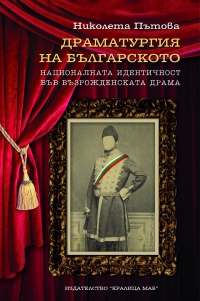Драматургия на българското
Staging Bulgaria
National Identity in the Drama from the Age of National Revival
Author(s): Nikoleta Patova
Contributor(s): Nikolay Aretov (Editor)
Subject(s): History, Theatre, Dance, Performing Arts, Language and Literature Studies, Fine Arts / Performing Arts, Cultural history, Theory of Literature
Published by: Кралица Маб
Keywords: drama; National Revival; Mythologization; History; Historians;
Summary/Abstract: This monograph offers the first of its kind historic and functional research of drama as a constructive, stabilizing and identity-interpreting ideological and artistic structure. To that end, the analyses, apart from the literary and cultural ones, set forth anthropological and social-psychological perspectives, as well, and that explains the multi-spectrum overview of Bulgarian identity during the second half of XIX century. The analysis of identity as an idea, character, sign and the inter-text approach used in the research allow for a large portion of the dramaturgical pieces to be included in new semantic paradigms, to outline unexpected parts of their world of meanings. The text contains various, non-traditional statements about drama as a possibility to interpret the ideas of own and foreign of the Bulgarian national revival and initiates in scientific requisition some little known and researched dramatic works dating from the age of the Bulgarian national revival.Proceeding from the understanding that identity is created in the complex relations between person and society and in inter-societal relations, as well, the monograph analyses examine the complex interaction of identities that the dramaturgical works expose and search for the collective image of the Bulgarian. The proverbial drama and comedy works stand alongside with dramaturgical texts with arguable artistic value, as all of them represent equally effective attempts to offer and form the signs of Bulgarian identity. The literary and cultural interpretation of the artistic texts is intertwined with the new spiritual, social, economic and ideological process during the crucial for Bulgarian society XIX century.The story about the process that Bulgarian national revival dramaturgy uses to mold the idea of Bulgarian is given in chronological order and is divided into four main parts that encompasses the historical past of Bulgarian people, the struggle for religious independence and national stereotypes provoked by it, as well as the complex relations between “own” and “foreign” that are inevitably made clear during periods critical for the community. The attention and analysis in Chapter One – “Dramatic Narratives of the Past: Mythologization and Symbolism”, is directed towards various elements that illustrate the creation of the paradigm of the heroic and the dishonorable. The narrative of the Bulgarian follows the major milestones in the development of community awareness. The heroic characters of Bulgarian national revival drama have their symbolic uses – out-of-context, the characters are perceived as models of the group/national virtues, as carriers of the “national spirit”. An attempt was made to summarize the main characters that come to the figures of the Ruler, the Warlord, the Prophet/Preacher, the Traitor and the Enemy. Bulgarian national revival works create or co-create three of the emblematic national symbols – Rayna Knyaginya, Hadji Dimitar and the first Bulgarian national anthem “Shumi Maritsa”. Chapter Two “Identity and National Symbols” tells of their rising in the light of cultural analysis. The next part “Return to the Present: From Symbolism to Reality” examines the identity-religion relations. The common image of the Greek clergy recreates the national stereotype of the “foreign” – Greek, firmly molded during the struggle for independent Bulgarian church.The final chapter – “Identities: Reality and Desiderations” comments on the Bulgarian national revival projections of modernity. Comedies and social drama pieces expose the confusing otherness. Through those, the drama of choice is followed that originates from the crisis of society readjustment. This final part reveals the Bulgarian fears and longings of Europe. The problematic cores that analyze the “own – foreign” relations are named here. Dramaturgical comments are set forth in the wide thematic field that shapes the questions “Who must we be” and “Who must we not be”. The answer to the former is more difficult to find and that is why it is no accident that Bulgarian national revival drama pieces do not succeed in creating a memorable positive image of the Bulgarian. One of the general contradictions of national identity lies in discovering the balance between tradition and modernity. In the ability to suppress the longings for the foreign and to master the fears of it.Dramaturgy looks for the ideal examples of the Bulgarian in the folklore or in more distant history. The building of identity is a dynamic process that assumes uncertain values in the 1870s. A constant in the molding of the ideas of the Bulgarian is the realized attitude toward it as a ground for pride. The assertion of Bulgarian honor and dignity is now valued as the most positive behavioral model.Bulgarian national revival dramaturgy is one of the most active participants in building the foundation of the Bulgarian national pantheon. The second half of XIX century, when this genre arises and is developed in our literature, is the most dynamic time of the national identity debate. Dramaturgy speaks and implies the significance of the Bulgarian, fills it with dignified content and attempts to predict the threats to national identity.
- Print-ISBN-13: 978-954-533-116-9
- Page Count: 256
- Publication Year: 2012
- Language: Bulgarian
- Table of Content
- eBook-PDF
- Sample-PDF
- Introduction

